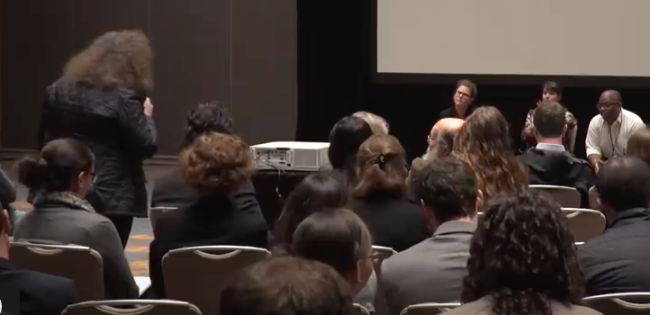You have /5 articles left.
Sign up for a free account or log in.

Mary Frances Williams, left, speaking at the annual meeting of the Society for Classical Studies
YouTube
A video recording of a widely talked-about incident at the annual meeting of the Society for Classical Studies differs somewhat from firsthand accounts that prompted the organization to ban a member from the January gathering in San Diego.
But the classics society is standing by its initial response to Mary Frances Williams, an independent scholar who was accused of making a racist statement to Dan-el Padilla Peralta, an assistant professor of classics at Princeton University.
Numerous society members present at a January session on the future of classics reported at the time that Williams, an audience member, told Peralta, a panelist, that he got his faculty job because he is black. In response to these reports, Mary T. Boatwright, society president, announced that Williams was told she should no longer participate in the meeting. The society’s Board of Directors also released a statement decrying racist acts and speech, which was prompted in part by a separate incident of alleged racial profiling of scholars at the conference hotel.
Recently released video of the exchange between Williams and Peralta shows that Williams didn’t say Peralta got his job because he is black, however. Rather, she said, “You may have got your job because you’re black, but I would prefer to think you got your job because of merit.”
Still, the society said in a new statement that despite the “factual correction,” its leaders stand by their initial response, which was reviewed by its Professional Ethics Committee.
“We repeat here that the future of classical studies depends on expansion, inclusion and focused attention on and action to remedy the underrepresentation of people of color in classics,” it said.
Williams referred a request for comment about the video to a piece she published on Quillette called, “How I Was Kicked Out of the Society for Classical Studies Annual Meeting.”
Williams wrote that she’d attended the panel because it seemed like an “opportunity to raise some questions and obtain some answers about what was happening in the field.”
Saying that she disagreed with speakers' ideas about how to diversify the field, Williams wrote that she was “under stress and did not express myself as clearly as I might have done.” What she’d hoped to convey, in response to Peralta’s idea that white male authors should take a “back seat” in terms of publishing to allow for more diverse voices, was that “the principle he was advocating clearly didn’t apply to hiring decisions -- and nor should it -- because he had got his job on merit, not because he’s black,” she said.
Williams also said that she was banned from the rest of the meeting without being given an opportunity to defend herself. She sees her transgression as merely disagreeing with Peralta and other panelists.
In many ways, the debate echoes others that have roiled classics and other humanities fields in recent years. Williams represents the classical approach to classics -- teach it the way it's long been taught, inspired by Western ideals. Others, including Peralta, want to radically change the field to encourage new voices and, arguably, save it from extinction. This debate represents a real philosophical divide. But sometimes those on either side of it talk past each other, falsely assuming that to teach classics in new ways means not teaching the canon, or vice versa.
Peralta has previously written about the incident, arguing that he indeed should have been hired because he is black, as his personal experiences lend particular insights and value to his historically white field. He said via email over the weekend that the video “doesn't change anything: racist insinuation is still (you guessed it) racist insinuation.”
He called William’s “apologia” on Quillette “unimaginative” and said that he’d received messages from Williams’s supporters that are “textbook demonstrations of white supremacy's capacity to turn people into ghouls.” He also said that Williams continued to wrongly assume that panelists didn't teach some of the classic texts she was interested in preserving.
The apparent “desire to cling anxiously to classics as a staging ground for their whiteness is not one that I have any interest in accommodating,” Peralta added. “I want classics to become a renewable resource for the cultivation and furtherance of a radically inclusive and equitable future, not a sclerotic exercise in the dysfunctional erotics of a ‘white’ past.”









